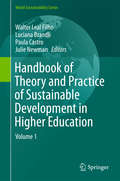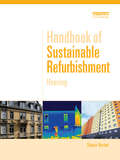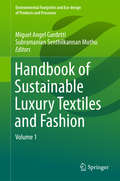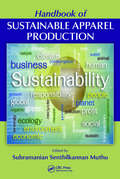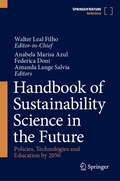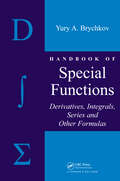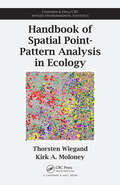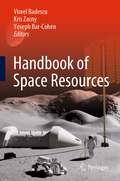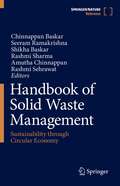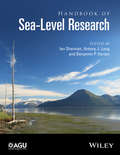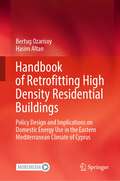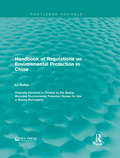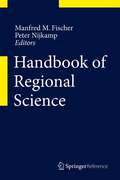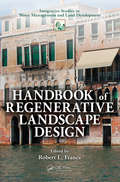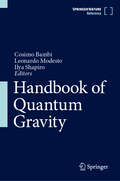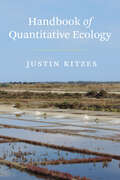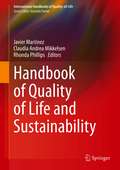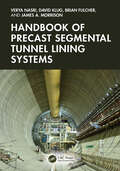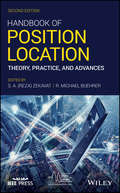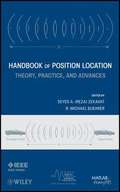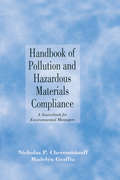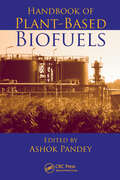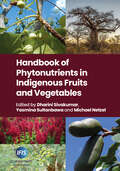- Table View
- List View
Handbook of Theory and Practice of Sustainable Development in Higher Education
by Walter Leal Filho Luciana Brandli Paula Castro Julie NewmanThis Handbook approaches sustainable development in higher education from an integrated perspective, addressing the dearth of publications on the subject. It offers a unique overview of what universities around the world are doing to implement sustainable development (i. e. via curriculum innovation, research, activities, or practical projects) and how their efforts relate to education for sustainable development at the university level. The Handbook gathers a wealth of information, ideas, best practices and lessons learned in the context of executing concrete projects, and assesses methodological approaches to integrating the topic of sustainable development in university curricula. Lastly, it documents and disseminates the veritable treasure trove of practical experience currently available on sustainability in higher education.
Handbook of Sustainable Refurbishment: Housing
by Simon BurtonBased on careful analysis and experience in all housing sectors and house types, this handbook explains and demonstrates how to incorporate the most effective energy saving measures in the existing housing stock.It begins by setting out the basic aims of sustainable refurbishment before presenting a large number of illustrated case studies from a range of single- and multi-family dwellings. A practical section then details the specific measures that can be taken to reduce the energy demand of buildings, with extensive references to further resources. Written for architects and building engineers, the book combines technical and managerial solutions demonstrating that a new refurbishment culture needs to be created that radically improves the energy performance of all existing houses whenever any opportunity presents itself and whenever any work is carried out.
Handbook of Sustainable Luxury Textiles and Fashion
by Subramanian Senthilkannan Muthu Miguel Angel GardettiThe second volume of handbook explores different dimensions of the sustainable luxury textiles and fashion, broadly based on the following topics: Sustainable luxury Luxury and consumption Luxury, innovation and design potential Luxury and entrepreneurship Sustainable Luxury Management
Handbook of Sustainable Apparel Production
by Subramanian Senthilkannan MuthuA hot-button societal issue, sustainability has become a frequently heard term in every industrial segment. Sustainability in apparel production is a vast topic and it has many facets. Handbook of Sustainable Apparel Production covers all aspects of sustainable apparel production including the raw materials employed, sustainable manufacturing proce
Handbook of Sustainability Science in the Future: Policies, Technologies and Education by 2050
by Walter Leal Filho Anabela Marisa Azul Amanda Lange Salvia Federica DoniHumanity will have to cope with many problems in the coming decades: for instance, the world population is likely grow to to 8,8 billion people by 2035. Also, changing climate conditions are negatively affecting the livelihoods of millions of people. In particular, environmental disasters are causing substantial damages to properties. From a social perspective, the inequalities between rich and poor nations are becoming even deeper, and in many countries, conflicts between national and international interest groups are intensifying.The above state of affairs suggest that a broader understanding of the trends which may lead to a more sustainable world is needed, especially those which may pave the way for future developments. In other words, we need to pave the way for sustainable futures.Consistent with this reality, the proposed Encyclopedia of Sustainability Futures aims to identify, document and disseminate ideas, experiences and visions from scientists, member of nongovernmental organisations, decision-makers industry representatives and citizens, on themes and issues which will be important in pursuing sustainable future scenarios. In particular, the publication will focus on scientific aspects, as well as on social and economic ones, also considering matters related to financing and infra-structures, which are important in pursuing a sustainable future.The Encyclopedia of Sustainability Futures will involve the contributing authors in line with theprinciple of co-generation, from across a wide range of disciplines, e.g. education and social sciences, natural sciences, engineering, the arts, languages etc, with papers adopting a long-term sustainability perspective, with a time horizon until 2050. The focus will be on themes which are felt as important in the future, and the chapters are expected to interest and motivate a world audience.This book is part of the "100 papers to accelerate the implementation of the UN Sustainable Development Goals initiative"!
Handbook of Special Functions: Derivatives, Integrals, Series and Other Formulas
by Yury A. BrychkovBecause of the numerous applications involved in this field, the theory of special functions is under permanent development, especially regarding the requirements for modern computer algebra methods. The Handbook of Special Functions provides in-depth coverage of special functions, which are used to help solve many of the most difficult problems in
Handbook of Spatial Point-Pattern Analysis in Ecology (Chapman & Hall/CRC Applied Environmental Statistics)
by Thorsten Wiegand Kirk A. MoloneyThis handbook shows how the techniques of point-pattern analysis are useful for tackling ecological problems. Within an ecological framework, it guides readers through a variety of methods for different data types and aids in the interpretation of the results obtained by point-pattern analysis. Along with the techniques, the book provides a comprehensive selection of real-world examples. Most of the examples are analyzed using the authors' software package Programita. The software and a manual are available online.
Handbook of Space Resources
by Yoseph Bar-Cohen Viorel Badescu Kris ZacnyEarth has limited material and energy resources, while these resources are virtually unlimited in space. It is only a matter of time, before planetary resources are mined and used in-situ to sustain human and robotic exploration or returned to Earth for commercial gain. This book covers a number of aspects related to space resources. In particular, subjects related to mission concepts, exploration approaches, mining and extraction technologies, commercial potential, and regulatory aspects of space resources are covered in detail. This book is therefore a good resource for readers who seek background and deeper understanding of space resources related activities.
Handbook of Solid Waste Management: Sustainability through Circular Economy
by Seeram Ramakrishna Shikha Baskar Chinnappan Baskar Rashmi Sharma Amutha Chinnappan Rashmi SehrawatThe issue and finding the green solution of Solid Waste Management are important challenges throughout the world. This book explores cutting edge developments in Circular Economy and Sustainability on Solid Waste Management, current research perspectives, existing problems on solid waste management system, industrial development and the latest green methodology for in Solid Waste conversion and regenerate products and materials, environmental solutions, social awareness and development on solid waste management and the future perspectives of Circular Economy for industrial revolution 4.0 with the mission of green chemistry and engineering on solid waste management. It focuses on chapters from different researchers, faculty members, scientists and engineers, industrialist and experts from different countries working on the Circular Economy on Solid Waste Management. It also features the importance of integration of multi-disciplinary research fields on Circular Economy for Sustainable Development. It provides latest development in and current research perspectives, technology development, and critical thinking and societal requirements and development on Circular Economy of Solid Waste Management to researchers, scientists, engineers, environmental managers, policy makers, and Experts of Energy Division of Government and Private Organization and Industries.^
Handbook of Sea-Level Research (Wiley Works)
by Ian Shennan Antony J. Long Benjamin P. HortonMeasuring sea-level change – be that rise or fall – is one of the most pressing scientific goals of our time and requires robust scientific approaches and techniques. This Handbook aims to provide a practical guide to readers interested in this challenge, from the initial design of research approaches through to the practical issues of data collection and interpretation from a diverse range of coastal environments. Building on thirty years of international research, the Handbook comprises 38 chapters that are authored by leading experts from around the world. The Handbook will be an important resource to scientists interested and involved in understanding sea-level changes across a broad range of disciplines, policy makers wanting to appreciate our current state of knowledge of sea-level change over different timescales, and many teachers at the university level, as well as advanced-level undergraduates and postgraduate research students, wanting to learn more about sea-level change. Additional resources for this book can be found at: www.wiley.com\go\shennan\sealevel
Handbook of Retrofitting High Density Residential Buildings: Policy Design and Implications on Domestic Energy Use in the Eastern Mediterranean Climate of Cyprus
by Bertug Ozarisoy Hasim AltanThis book investigates energy use and measures to improve the energy efficiency of public housing, using post-war social housing development estates in Cyprus as its example. On this Mediterranean island, which experiences hot and humid temperatures throughout the year, residential buildings need to adapt to the climate to improve the thermal comfort of their occupants. The book assesses the domestic energy use of inefficiently built residential tower blocks and their occupants’ thermal comfort by considering the significant impact of overheating risks on energy consumption and occupants’ thermal comfort and well-being, with the intention of evaluating the current energy performance of base-case representative residential tower blocks (RTBs). In particular, considering the cooling energy demand in the summer, using Famagusta, Cyprus as a case study. It seeks to identify the impact of occupancy patterns and habitual adaptive behaviour of households on home energy performance in order to provide bases for the information needed to calibrate building energy performance of targeted households.
Handbook of Regulations on Environmental Protection in China (Routledge Revivals)
by Lu RuilanThe Handbook of Regulations on Environmental Protection in China details the environmental laws, regulations and standards in China for those enforcing and creating environmental policy as it stood in the early 1990’s. Originally published in English in 1994, this translation aims to illuminate an English-speaking audience on Chinese environmental policy on areas such as pollution, food standards and waste management. This title will be of interest to students of Environmental Studies.
Handbook of Regional Science
by Peter Nijkamp Manfred M. FischerThe Handbook of Regional Science is a multi-volume reference work providing a state-of-the-art knowledge on regional science composed by renowned scientists in the field. The Handbook is intended to serve the academic needs of graduate students, and junior and senior scientists in regional science and related fields, with an interest in studying local and regional socio-economic issues. The multi-volume handbook seeks to cover the field of regional science comprehensively, including areas such as regional housing and labor markets, regional economic growth, innovation and regional economic development, new and evolutionary economic geography, location and interaction, the environment and natural resources, spatial analysis and geo-computation as well as spatial statistics and econometrics.
Handbook of Regenerative Landscape Design
by Robert L. FranceWhat if environmentally damaged landscapes could not only be remediated from an ecological standpoint, but also designed to replenish an entire community as well as the nature surrounding it? The Handbook of Regenerative Landscape Design incorporates ecology, engineering, sociology, and design elements into a new paradigm for environmental r
Handbook of Quantum Gravity
by Cosimo Bambi Ilya Shapiro Leonardo ModestoThe search for a theory of quantum gravity is one of the most important and fascinating problems in modern theoretical physics. While we do not have yet a complete theory of quantum gravity, significant advancements have been done in the past decades. In this handbook, every section is dedicated to a specific approach towards a theory of quantum gravity and is edited by the leading experts in the field. This book represents both a valuable resource for graduate students and an important reference for researchers in quantum gravity.
Handbook of Quantitative Ecology
by Justin KitzesAn essential guide to quantitative research methods in ecology and conservation biology, accessible for even the most math-averse student or professional. Quantitative research techniques have become increasingly important in ecology and conservation biology, but the sheer breadth of methods that must be understood—from population modeling and probabilistic thinking to modern statistics, simulation, and data science—and a lack of computational or mathematics training have hindered quantitative literacy in these fields. In this book, ecologist Justin Kitzes addresses those challenges for students and practicing scientists alike. Requiring only basic algebra and the ability to use a spreadsheet, Handbook of Quantitative Ecology is designed to provide a practical, intuitive, and integrated introduction to widely used quantitative methods. Kitzes builds each chapter around a specific ecological problem and arrives, step by step, at a general principle through the process of solving that problem. Grouped into five broad categories—difference equations, probability, matrix models, likelihood statistics, and other numerical methods—the book introduces basic concepts, starting with exponential and logistic growth, and helps readers to understand the field’s more advanced subjects, such as bootstrapping, stochastic optimization, and cellular automata. Complete with online solutions to all numerical problems, Kitzes’s Handbook of Quantitative Ecology is an ideal coursebook for both undergraduate and graduate students of ecology, as well as a useful and necessary resource for mathematically out-of-practice scientists.
Handbook of Quality of Life and Sustainability (International Handbooks of Quality-of-Life)
by Rhonda Phillips Javier Martinez Claudia Andrea MikkelsenThis handbook provides the latest research related to quality of life and sustainability, taking into account social, economic, environmental, and political/governance aspects as well as specific socio-spatial contexts. The volume includes contributions from established and upcoming scholars from various disciplines and geographical contexts (Global South and North). The varying cultural and socio-spatial contexts of the authors in the selected cases contribute to first-hand knowledge on the realities of sustainability issues affecting the quality of life. The authors apply a wide diversity of methods and tools, which facilitates a unique understanding of the interlinkages between quality of life and sustainability. The chapters are grouped in three main sections: concepts and foundations; tools, techniques, and applications; and innovations. The authors provide their own view and theoretical approximation of the dimensions of sustainability, in particular on how these dimensions play out in relation to quality of life. The combination of sustainability and quality of life concepts and perspectives is particularly important in unravelling the multi-faceted nature of human, urban, rural/spatial development.
Handbook of Precast Segmental Tunnel Lining Systems
by Verya Nasri David Klug Brian Fulcher James A. MorrisonThis comprehensive handbook covers all aspects of design, production, and construction of precast concrete tunnel segmental lining, with the best practices in the field included in one book for the first time.New and current design methods and quantitative analyses are considered in line with ACI and ASTM codes, as well as a full selection of global standards for the reliable design of the product and all components. Also incorporated are new applications of science and technology, such as new admixtures, and the latest manufacturing processes and precisions, such as tight dimensional controls and high repeatability cycles.With detailed guidance from world-leading practitioners, this is the definitive international technical and practical manual on these linings, forming a one-stop reference for tunnel engineers and an invaluable resource for advanced students in civil, mechanical, and mining engineering.
Handbook of Position Location: Theory, Practice, and Advances (IEEE Series on Digital & Mobile Communication #27)
by Reza Zekavat R. Michael BuehrerA comprehensive review of position location technology — from fundamental theory to advanced practical applications Positioning systems and location technologies have become significant components of modern life, used in a multitude of areas such as law enforcement and security, road safety and navigation, personnel and object tracking, and many more. <p><p> Position location systems have greatly reduced societal vulnerabilities and enhanced the quality of life for billions of people around the globe — yet limited resources are available to researchers and students in this important field. The Handbook of Position Location: Theory, Practice, and Advances fills this gap, providing a comprehensive overview of both fundamental and cutting-edge techniques and introducing practical methods of advanced localization and positioning. <p> Now in its second edition, this handbook offers broad and in-depth coverage of essential topics including Time of Arrival (TOA) and Direction of Arrival (DOA) based positioning, Received Signal Strength (RSS) based positioning, network localization, and others. Topics such as GPS, autonomous vehicle applications, and visible light localization are examined, while major revisions to chapters such as body area network positioning and digital signal processing for GNSS receivers reflect current and emerging advances in the field. <p> The Handbook of Position Location: Theory, Practice, and Advances is valuable resource for practicing engineers and researchers seeking to keep pace with current developments in the field, graduate students in need of clear and accurate course material, and university instructors teaching the fundamentals of wireless localization.
Handbook of Position Location: Theory, Practice and Advances, 1st Edition
by Reza Zekavat R. Michael BuehrerRadio systems capable of localization have emerging applications in homeland security, law enforcement, emergency response, defense command and control, multi-robot coordination and vehicle-to-vehicle and vehicle-to-pedestrian collision avoidance. In fact, high resolution localization is vital for many applications, including: traffic alert, emergency services, e.g., indoor localization for firefighters, and battlefield command and control. These systems promise to dramatically reduce society's vulnerabilities to catastrophic events and improve its quality of of life. While work this important area is progressing, limited resources are available to support graduate students and researchers in this important area. Specifically, a limited number of books has been published in this area covering selected subjects. This comprehensive handbook offers gaps of available localization books presenting in-depth coverage from fundamentals of coordinates to advanced application examples.
Handbook of Pollution and Hazardous Materials Compliance: A Sourcebook for Environmental Managers (Environmental Science & Pollution)
by Nicholas P. Cheremisinoff Madelyn GraffiaOffers a guide to current environmental health and safety statutes--providing a working knowledge of the major legislations and regulations and demonstrating the steps necessary for compliance. Illustrates overall health and safety management skills for multimedia facilities.
Handbook of Pollution Prevention Practices (Environmental Science & Pollution)
by Nicholas P. CheremisinoffThis text provides approaches and methodologies for implementing pollution prevention (P2) and waste minimization programmes to reduce manufacturing operational costs significantly. It focuses on reducing manufacturing and environmental compliance costs by instituting feedstock substitution, improved operational schemes, recycling and by-product re
Handbook of Pollution Control and Waste Minimization
by Abbas Ghassemi"Details the legal, organizational, hierarchical, and environmental components of pollution prevention and waste reduction. Illustrates fundamental concepts of pollution prevention, including life-cycle planning and analysis, risk-based pollution control, and industrial ecology."
Handbook of Plant-Based Biofuels
by Ashok PandeyExplores Worldwide Trends Involving the Production and Use of BiofuelsWith the depletion of oil resources as well as the negative environmental impact of fossil fuels, there is much interest in alternative energy sources. Focusing on some of the most important alternate energy sources for the foreseeable future, the Handbook of Plant-
Handbook of Phytonutrients in Indigenous Fruits and Vegetables
by Rajeev Bhat Michael Rychlik Hosakatte Niranjana Murthy Fozia Homa Víctor M Jiménez Mohammad Akhtaruzzaman Stephen Akinola Saleha Akter Mohammad Khairul Alam Adeyemi Oladapo Aremu Manjeshwar Shrinath Baliga Harish Kumar Bastimal Amina Benabdallah Tania Chacón-Ordóñez N.N.G. Chiranthika Daniel Cozzolino Maral Seidi Damyeh Patricia Esquivel Héctor Estrada-Medina Olaniyi Amos Fawole Mohsina Ferdous Miriam Monserrat Ferrer Selina Fyfe Cyrielle Garcia Nadaraj Govender Prasanna P. Gunathilake Ummai Habiba Chafik Hdider H.A.C.O Hettiarachchi Lee-Hoon Ho Riadh Ilahy Beguvalli Subash Inchara Sheikh Nazrul Islam G. Janarny Eugénie Kayitesi Helyes Lajos Vimbainashe E. Manhivi Florence M. Mashitoa Petunia Mashiane Bárbara Paes Mata Patricia Irene Montañez-Escalante Niranjana Moorthi Isabela Jacob Moro Mack Moyo Siphosanele Mafa Moyo Adaucto Bellarmino Netto Gabi Netzel Dr Michael Netzel Olubukola Motunrayo Odeyemi Abiodun Olusola Omotayo Miriam Ferrer Ortega Karkala Sreedhara Pai Karkala Usha Pai Giriyapura Srikantachar Pavankumar Zoltán Pék Elisa Dos Pereira Adaucto B. Pereira-Netto Anh Dao Phan Charlotte Ralison Vonimatra Razafindrazaka María del Ruenes-Morales Luis Vitor Sacramento Mateus Kawata Salgaço André Gonzaga Santos Horst Joachim Schirra Dr Mohammed Wasim Siddiqui Faith Seke Ambreen Naz Shah Md. Tariqul Shajib Kátia Sivieri Heather E Smyth Sukirtha Srivarathan Thuan-Chew Tan Imen Tlili Annegowda Hardur Venkatappa Juliana Vinholes Márcia Vizzotto Olivia Wright Guggalada Govardhana YadavThe effects of inadequate diets on the population include malnutrition, non-communicable diseases and obesity. 'Hidden hunger', also known as micronutrient deficiencies, leads to various health-related disorders and diseases. Indigenous plants, in the form of indigenous fruits and leafy vegetables are gaining interest as a source of nutrients and bioactive phytochemicals, satisfying both food demand and health needs. Moreover, with the impact of climate change, and the importance of sustainability of food systems, it is essential that we investigate new, forgotten and alternative crops that can thrive in harsh conditions, require low fertilizer input, and are easily harvestable. This book contains chapters on 33 understudied indigenous fruits and vegetables from all around the world, including African nightshade, amaranth, baobab fruit, Indian gooseberry, red bush apple and snake melon. Each chapter provides: An overview of plant botany. An understanding of the phytonutrient constituents and health-promoting properties of bioactive compounds or metabolites. Information on the biological activity of the functional compounds that will improve productivity and increase utilization of indigenous fruits and vegetables to sustain food security. Impacts of postharvest storage, processing, and traditional food preparation methods. Potential for new product development. This is an essential resource for academic researchers and industry professionals in the fields of horticulture, agriculture, crop science, human health and nutrition.
